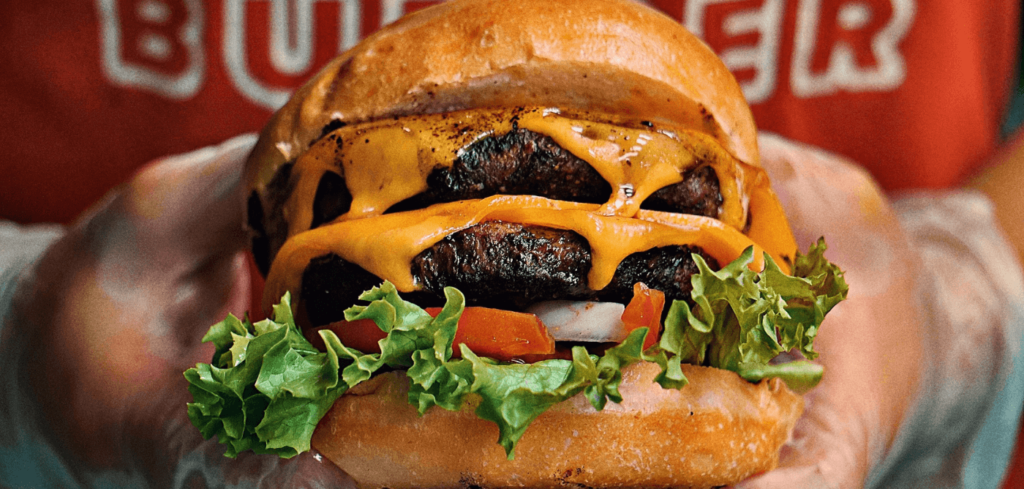
Who doesn’t love a cheeseburger?
I know I sure do, and I’m sure your little fur baby would love one too if you allowed him to eat one…
But can dogs eat cheeseburgers? Well, that’s an interesting question that many people actually have…
And in this article, I’ll be answering that question in a very detailed way by covering the following topics…
- Can Dogs Eat Cheeseburgers?
- Can Dogs Eat Burgers (Just The Meat)?
- Can Dogs Eat Cheese With A Plain Burger?
- Can Dogs Eat Bread Or A Burger Bun?
- Can Dogs Eat Onions, Lettuce, Pickles, And Tomatoes?
- Can Dogs Eat McDonalds Cheeseburgers (Or Other Fast Food Burgers)?
In the end, you’ll know why dogs can eat cheeseburgers, but you’ll also know all the ingredients commonly found in cheeseburgers that you need to avoid.

Can Dogs Eat Cheeseburgers?
Yes. Dogs can eat cheeseburgers, but you will want to omit several ingredients that are typically found in cheeseburgers. For example, onions can be fatal for dogs, and high levels of salt and fat can cause things like Sodium Ion Poisoning and even Pancreatitis…
The best way to narrow down which ingredients in a cheeseburger may be suitable for your dog is to go through them one by one…
Can Dogs Eat Burgers (Just The Meat)?
Dogs can certainly eat plain hamburger meat, and it can actually be a great source of protein for them…
It is important to make sure that the meat is fully cooked before giving it to your dog because undercooked meat has a higher risk of giving your dog food poisoning…
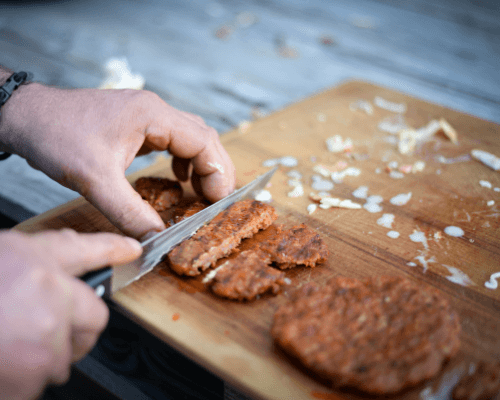
Things like E-coli, Salmonella, and other bacteria can be found in raw meat, but as long as you cook the meat fully through, you shouldn’t have any problems…
Aside from that, you should avoid seasoning the meat with things like salt, garlic, and other spices because these seasonings can cause serious illness to your dog…
Salt…
If dogs eat too much salt, they can get sodium ion poisoning (also called Salt Poisoning). Salt Poisoning can be life-threatening to dogs, and some of the symptoms include:
- Vomiting
- Clear or watery diarrhea
- No appetite
- Lethargy
- Muscle spasms or shaking
- Nausea
- Coma
- Death
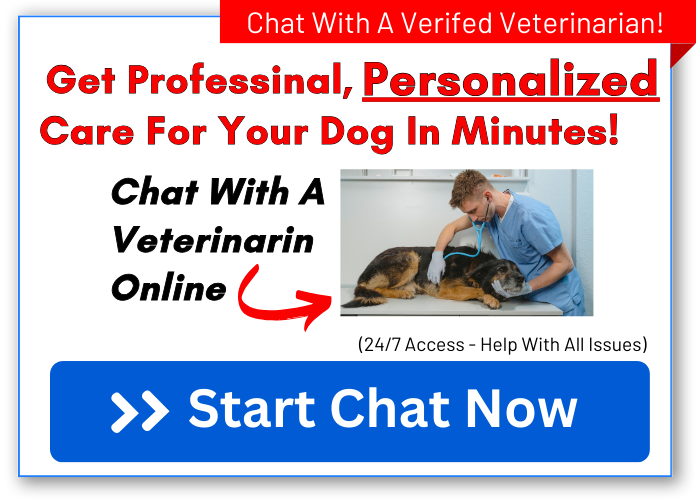
Garlic…
Garlic is known to contain toxins that can damage your dog’s red blood cells and cause anemia…
It also causes dogs to have several gastrointestinal issues such as vomiting, diarrhea, and stomach pain or discomfort…
So in the end, stick to keeping the burger meat plain (without any seasoning) and fully cooked, and your dog will have no problems eating it.
Can Dogs Eat Cheese With A Plain Burger?
There are certain types of cheese that are off-limits to dogs. For example, Blue Cheese contains mold which can cause gastrointestinal problems in dogs such as vomiting and even seizures…
But usually, a small amount of Swiss Cheese, Cheddar Cheese, Provolone, or Mozzarella is a harmless and tasty treat for our four-legged friends…
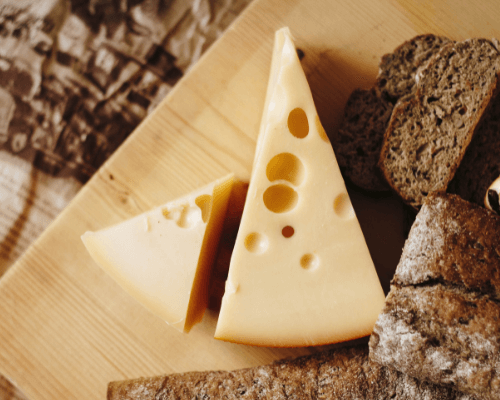
In fact, cheese in moderation can help provide your dog with nutrients like Vitamin A and Omega-3 fatty acids…
So a plain cheeseburger using a limited amount of cheddar cheese won’t cause your dog any problems unless he or she is lactose intolerant…
A lactose intolerant dog should not be fed any cheese even in moderation because even a small amount can cause a number of digestive issues.
Can Dogs Eat Bread Or A Burger Bun?
As long as it’s done in moderation, it is safe for dogs to eat bread and burger buns (as long as they don’t have a food allergy)…
The reason why you want to keep bread to a minimum (when it comes to feeding your dog) is that it doesn’t contain any nutrition that he or she isn’t already getting from healthy dog food…
In addition to that, we all know that bread contains a lot of carbs, and if a dog starts eating too much of it, he could be on his way to developing obesity.
Can Dogs Eat Onions, Lettuce, Pickles, And Tomatoes?
Some of the toppings that you commonly find on cheeseburgers are safe for dogs to consume, however, others should be avoided at all costs…
For example, lettuce is a low-calorie food that dogs seem to love crunching down on, and tomatoes are also safe as long as they’re ripe…
But things like onions, pickles, ketchup, and mustard are all foods that (like chocolate) should never be fed to a dog for several different reasons…
Why Can’t Dogs Eat Onions?
The leaves, flesh, and juice of onions are all toxic to dogs. In addition to that, processed onion powders can also be harmful…
You see, much like with garlic, the toxins within onions can cause your dog’s red blood cells to start to break down, which will eventually lead to anemia…
And as that’s happening, your dog will suffer from symptoms like vomiting, lethargy, loss of appetite, and possibly reddish urine…
So onions should never be fed to your dog under any circumstances, and if your dog does consume onions, you should contact a veterinarian immediately.

Why Can’t Dogs Eat Pickles?
Even though pickles are typically not toxic to dogs, you should still avoid feeding them to your fur baby…
The reason why is because of the extremely high level of sodium that you’ll usually find in the brine and pickles themselves…
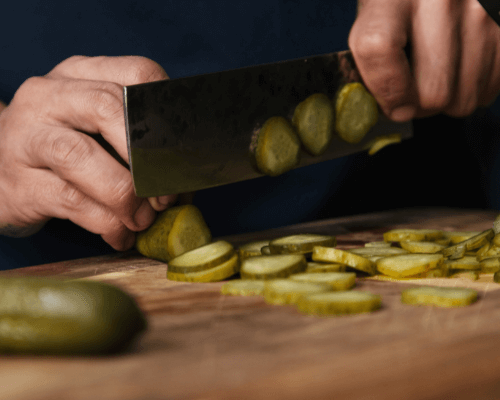
As I mentioned earlier, too much salt could lead to Salt Poisoning in your dog, and on top of that…
…the salt-water brine may contain things like onions and garlic, which can also be harmful to our canine friends.
Why Can’t Dogs Eat Ketchup?
The major problem for dogs when it comes to ketchup is, again, the high level of salt that’s usually found in it…
On top of that, sometimes ketchup will contain chemicals and artificial flavorings that are not suitable for dogs to consume.
Why Can’t Dogs Eat Mustard?
Dogs should never be allowed to eat mustard because it contains toxins that can lead to gastroenteritis…
Gastroenteritis is when your dog has inflammation in his or her stomach and intestines…
And it’s common for dogs who’ve eaten a lot of mustard to start throwing up and have diarrhea, aside from having abdominal pain.
Can Dogs Eat McDonalds Cheeseburgers (Or Other Fast Food Burgers)?
Even though your dog can technically eat a cheeseburger from Mcdonalds and other fast-food restaurants, it’s probably best to avoid it. Even if you take out all the toxic ingredients like onions and mustard, the plain cheeseburger will still contain a high level of salt and grease…
We’ve already talked about the problems that ingesting too much salt can cause for your dog…
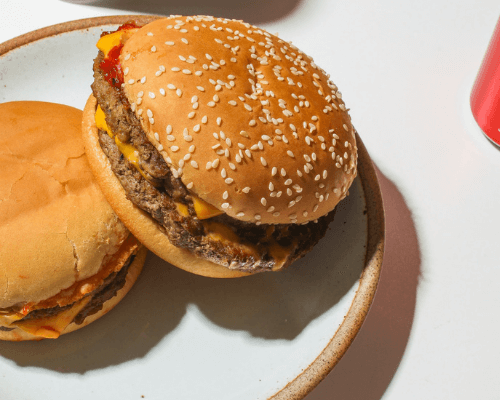
…but if your pup eats too much fatty or greasy food, it can lead to an upset stomach and possibly pancreatitis in the future.
So because of that, if you want to give your furry friend a cheeseburger treat, avoid the fast-food chains and stick to something homemade…

Final Thoughts – Stick To A Dog-Friendly Cheeseburger…
So in the end, dogs can eat cheeseburgers, but if you’re planning on giving your dog a cheeseburger treat, you really want to make sure that it’s “dog-friendly” beforehand…
Make the burger at home, so you can control and know all the ingredients that are included…
And remember to keep the hamburger plain (with no salt or extra seasoning), make sure you cook it all the way through, limit the amount of cheese (and try to pick a cheese that is low-fat)…
And avoid toppings like onions, pickles, ketchup, and mustard. If you do, your dog will love it…
…and you’ll be able to avoid risking the health and safety of your pup as you feed him a tasty reward.